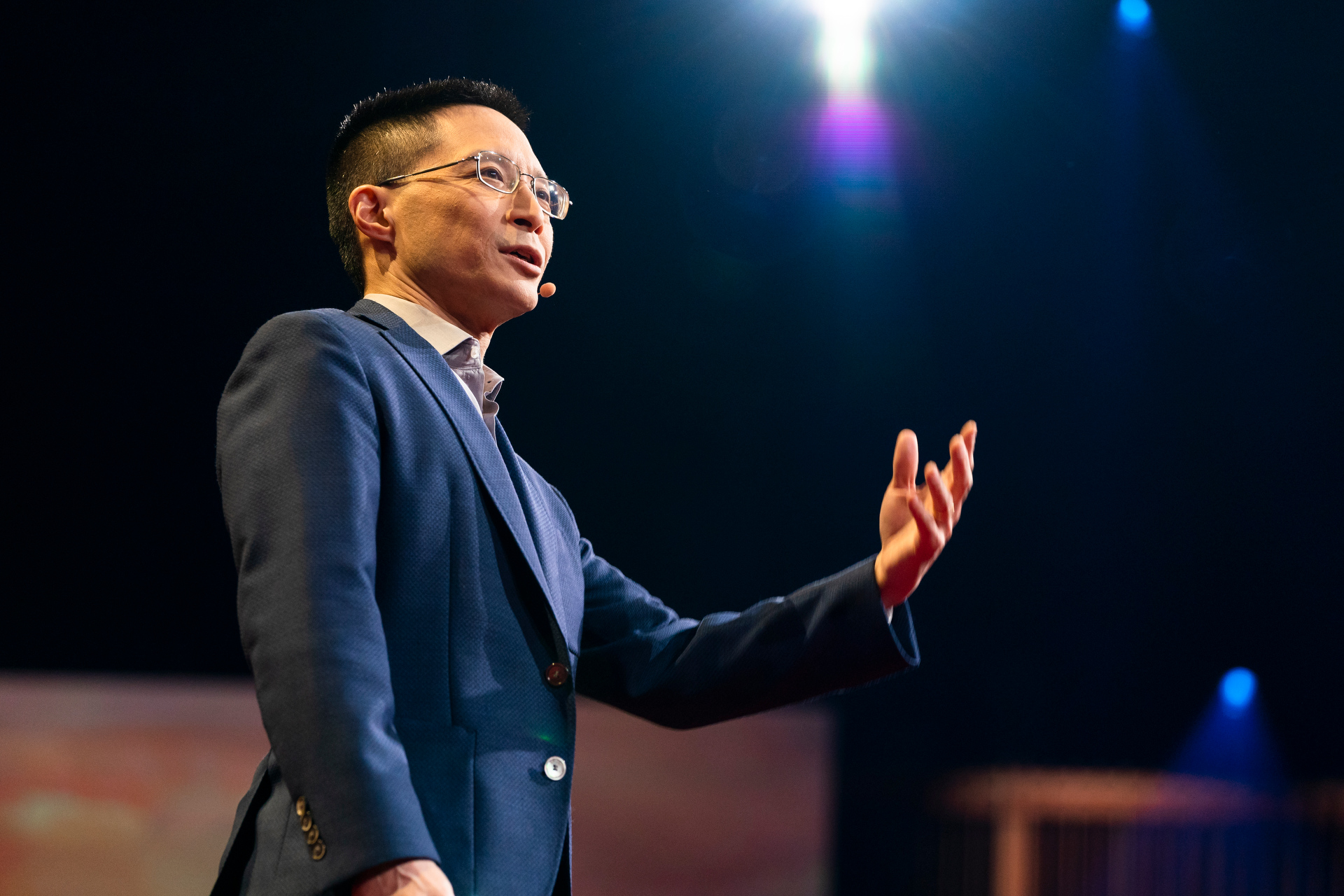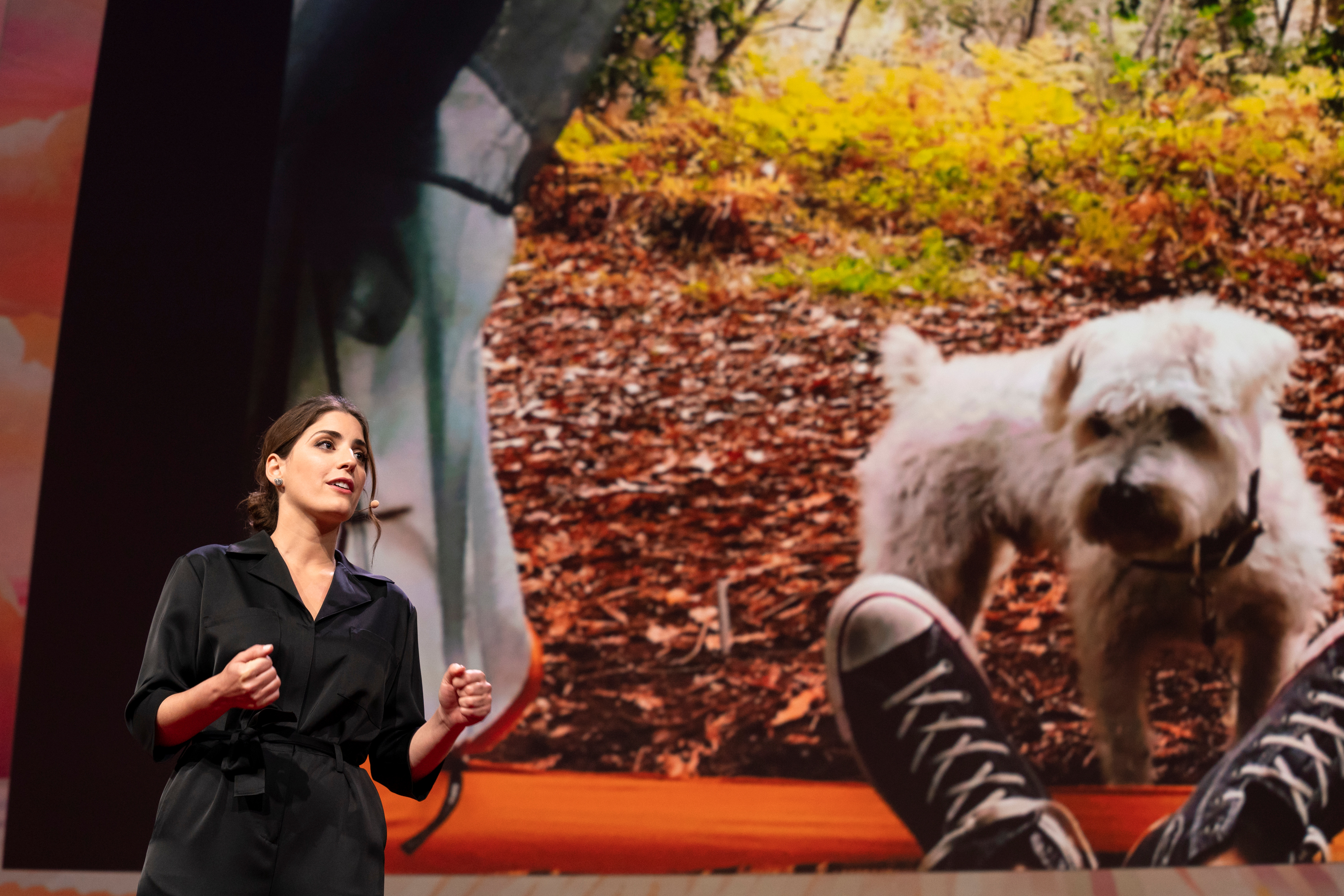
Eric Liu asks us to commit to being active citizens — wherever we are. He speaks at TED2019: Bigger Than Us, on April 19, 2019, in Vancouver, BC, Canada. Photo: Ryan Lash / TED
The final session of TED2019 was a spectacle. From powerful calls to civic engagement and ancestorship to stories of self and perseverance, the session wrapped an incredible week and soared through the end with an unforgettable, totally improvised wrap-up.
The event: Talks and performances from TED2019, Session 12: Meaning, hosted by TED’s Chris Anderson, Helen Walters and Kelly Stoetzel
When and where: Friday, April 19, 2019, 9am, at the Vancouver Convention Centre in Vancouver, BC
Speakers: Eric Liu, Yeonmi Park, Suleika Jaouad, David Brooks, America Ferrera, Bina Venkataraman
Music: Richard Bona on guitar
Mindblowing, completely improvised wrap-up covering the whole week: Freestyle Love Supreme: Anthony Veneziale, Chris Jackson, Chris “Shockwave” Sullivan, Utkarsh Ambudkar, Arthur Lewis
The talks in brief:
Eric Liu, author and CEO of Citizen University
- Big idea: Instead of feeling despair at the state of the world, we need to commit to living as active, responsible citizens of our societies.
- How? At a time when the free world seems leaderless, Liu says that we should seek hope not in leadership but in each other. His proposal: that we learn to practice “civic religion” and commit to being active in our citizenship. In pursuit of this, Liu started Civic Saturdays in 2016. These take a similar format to faith-based gatherings, with songs and sermons, but they all stem from shared ideals and a desire for fellowship. Participants then work together to organize rallies, register voters and improve their communities. Liu hopes this can counter the emerging culture of hyperindividualism, where “we are realizing now that a free-for-all is not the same as freedom for all,” and instead build community where we feel empowered to bring about, and not wait for, meaningful change.
- Quote of the talk: “Power without character is a cure worse than the disease.”
Yeonmi Park, human rights activist
- Big idea: Everything must be taught, even the fundamentals we sometimes take for granted: freedom, compassion, love.
- How? Right vs. wrong, justice vs. injustice — these aren’t concepts we inherently understand, says human rights activist Yeonmi Park. Telling her story of escape from North Korea, Park says that life there is “a totally different planet.” She gives an unsettling example: there’s only one definition of love in North Korea — “love for the Dear Leader.” Romantic love doesn’t exist as a concept or possibility. And for most North Koreans, neither does freedom. Now a US citizen, Park calls for us to fight for North Koreans — for all oppressed people around the world — who cannot speak for themselves. Freedom is fragile, she says. Who will fight for us when we’re not free?
- Quote of the talk: “Nothing is forever in this world, and that’s why we have every reason to be hopeful.”
David Brooks, political and cultural commentator, New York Times Op-Ed columnist
- Big idea: Our society is not only sinking into economic, environmental and political crises — we’re also mired in a deepening social crisis, trapped in a valley of isolation and fragmentation. How do we find our way out of this valley?
- How? Society tells us that success is everything, that those with less success are less important, and that we can bootstrap ourselves to happiness without the help of other people. All of these maxims, says David Brooks, are lies. Brooks believes that those he calls “weavers” — community workers who re-knit social bonds on a local level — will create a “cultural and relational revolution” that leads each of us out of loneliness and into a new world of joy and social connection.
- Quote of the talk: “We need a cultural and relational revolution … My theory of social change is that society changes when a small group of people find a better way to live, and the rest of us copy them.”

Suleika Jaouad speaks at TED2019: Bigger Than Us. April 15 – 19, 2019, Vancouver, BC, Canada. Photo: Bret Hartman / TED
Suleika Jaouad, cancer survivor and author of the soon-to-be-published memoir Between Two Kingdoms
- Big idea: As we start to live longer, we will spend more of our lives navigating between being sick and well. We need to break down the idea that the two are wholly separate.
- How? Jaouad’s recovery from leukemia in her mid-20s is best described in her own words: “The hardest part of my cancer experience began once the cancer was gone. That heroic journey of the survivor we see in movies and watch play out on Instagram? It’s a myth. It isn’t just untrue; it’s dangerous, because it erases the very real challenges of recovery.” Nothing about being ill had prepared her for re-entering the world of the well. So Jaouad calls on us to break down the boundary between the two. “If we can all accept that we are not either ‘well’ or ‘sick’ but sometimes in between, sometimes forever changed by our experiences, we can live better.”
- Quote of the talk: “You can be held hostage by the worst thing that’s ever happened to you and allow it you hijack your remaining days, or you can find a way forward.”
America Ferrera, actor, director and activist
- Big idea: By putting representation into practice in our media, we can honor the extraordinary richness of humanity.
- How? In her breakthrough hits Real Women Have Curves and Ugly Betty, Ferrera brought her authentic self to her work, leading to critical, cultural and financial success. She gave voice to multi-dimensional characters typically uncentered in media, allowing them to “exist in the center of their own lives.” But that wasn’t enough: though directors and producers would privately praise diversity efforts, the entertainment industry was slow to change. This was frustrating because shows like Ugly Betty gave people around the world — including Pakistani activist Malala Yousafzai — their first chance to see themselves onscreen. But if we stay courageous and ensure our actions follow our intentions, Ferrera says, we can create media that reflects the world we live in and honors the genuine humanity of all.
- Quote of the talk: “Change will come when each of us has the courage to question our own fundamental values and beliefs and see to it that our actions lead to our best intentions.”
Bina Venkataraman, writer and futurist
- Big idea: As both descendants and ancestors of civilization, we must step out of our culture of immediacy and fight the allure of everyday minutiae, and think of generations to come.
- How? Own up to the mistakes we’ve made and redesign the communities, businesses and institutions that fail at helping us prepare for things to come. What we measure, reward and fail to imagine keeps us from making strides toward shared, significant success as a species. Our foresight is impaired — in order to fix it, we need to shift and see the world and the people in it as a part of a shared resource, where the progress we make now can make be passed down to our collective children and grandchildren.
- Quote of the talk: “When we think about the future, we tend focus on predicting exactly what’s next; whether we’re using horoscopes or algorithms to do that, we spend a lot less time imagining all the possibilities the future holds.”